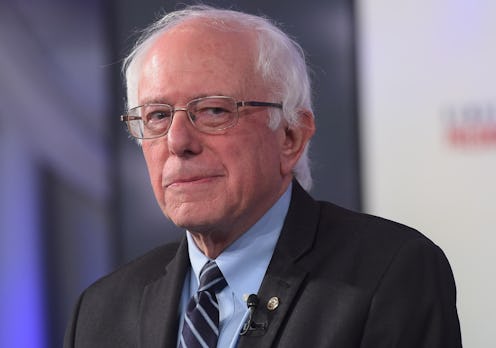News
How Bernie's Climate Plan Differs From Hillary's
As leaders from around the world try to come to a consensus at the United Nations climate change summit in Paris, Bernie Sanders released his presidential climate plan on Monday. In true Sanders fashion, the 16-page plan focuses on the billion-dollar fossil fuel industry, advocating for ending subsidies to fossil fuel companies and limiting their contributions to political campaigns. Hillary Clinton, Sanders' biggest competitor for the Democratic presidential nomination, released her own climate plan in July. There are a few key ways in which Sanders' plan differs from Clinton's.
Both placed an emphasis on transitioning the country's energy sources from fossil fuels to renewable options. "We will act boldly to move our energy system away from fossil fuels toward energy efficiency and sustainable energy sources like wind, solar, and geothermal," reads Sanders plan, "because we have a moral responsibility to leave our kids a planet that is healthy and habitable." Clinton wants the U.S. to have more than half a billion solar panels installed by the end of her first term. Sanders' plan also pushed solar energy, saying "Bernie believes that solar energy is one of the most promising sources of clean energy for America's future."
Though Clinton's campaign website says that her initial plan was only part of her energy and climate agenda, she doesn't even touch on some of the issues which Sanders' plan brings up. Here are four ways Sanders' and Clinton's plans are quite different.
On The Fossil Fuel Lobby
While Clinton's plan doesn't address the giant fossil fuel lobby fighting actions against climate change, Sanders heavily focused on this issue. "The fossil fuel industry spends billions and billions of dollars lobbying and buying candidates to block virtually all progress on climate change," it reads. He wants to stop the industry from stationing lobbyists in the White House, to end subsidies for fossil fuel companies, to create a national climate justice plan, and to fight to overturn the Supreme Court's Citizens United decision, which allowed corporations to spend unlimited amounts on political activities.
On Clean Energy
Sanders' goal for the nation's clean energy use is ambitious. He wants to create a 100 percent clean energy system for electricity, heating, and transportation. Not only will this minimize America's dependence on foreign oil, his plan says, but it will also create 10 million "good-paying jobs." Clinton's goal is for the U.S. to generate enough clean renewable energy to power every home in America within 10 years of her taking office — which would be a vast improvement, but doesn't account for transportation along with housing.
On Transportation
According to the Environmental Protection Agency, the transportation sector accounts for 27 percent of America's total greenhouse gas emissions. Since just calling for 100 percent clean energy for transportation wouldn't offer any real solutions, Sanders' plan advocates for building electric vehicle charging stations, as well as high-speed passenger and cargo trains, around the country. Clinton's plan would create a Clean Energy Challenge to develop partnerships between the federal government and states, cities, and communities wanting to increase their renewable energy, which she says would help "modernize our transportation system." However, the details about this Clean Energy Challenge remain vague.
On Global Leadership
Clinton's current plan doesn't mention any goals for increasing America's leadership in the global fight against climate change. Sanders', on the other hand, says that he'll establish a climate summit with engineers, climate scientists, policy experts, activists, and indigenous communities within his first 100 days in office. His plan says: "The United Nations Paris climate talks in December are an important milestone toward solving climate change, but even optimistic outcomes of these talks will not put the world on the path needed to avoid the most catastrophic results of climate change. We must think beyond Paris."
